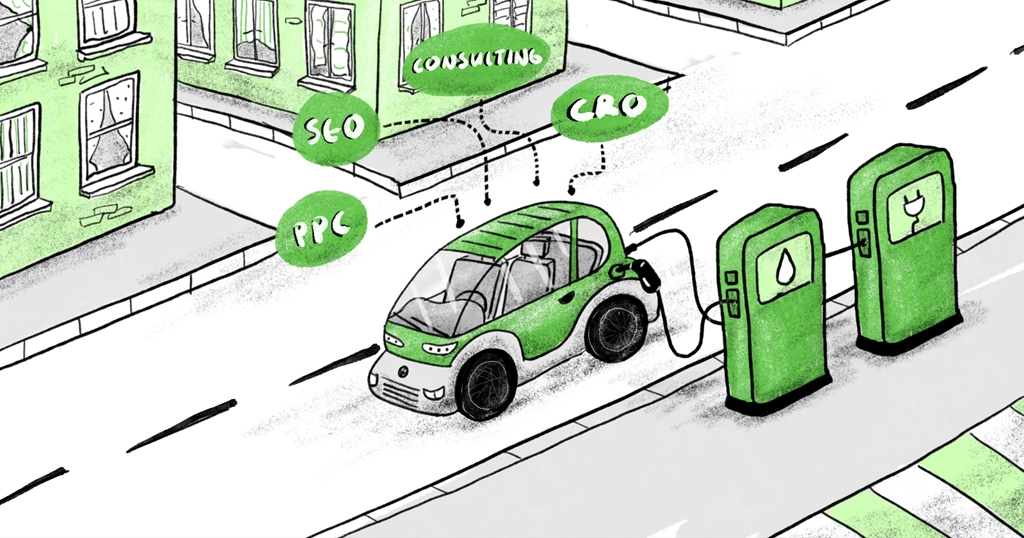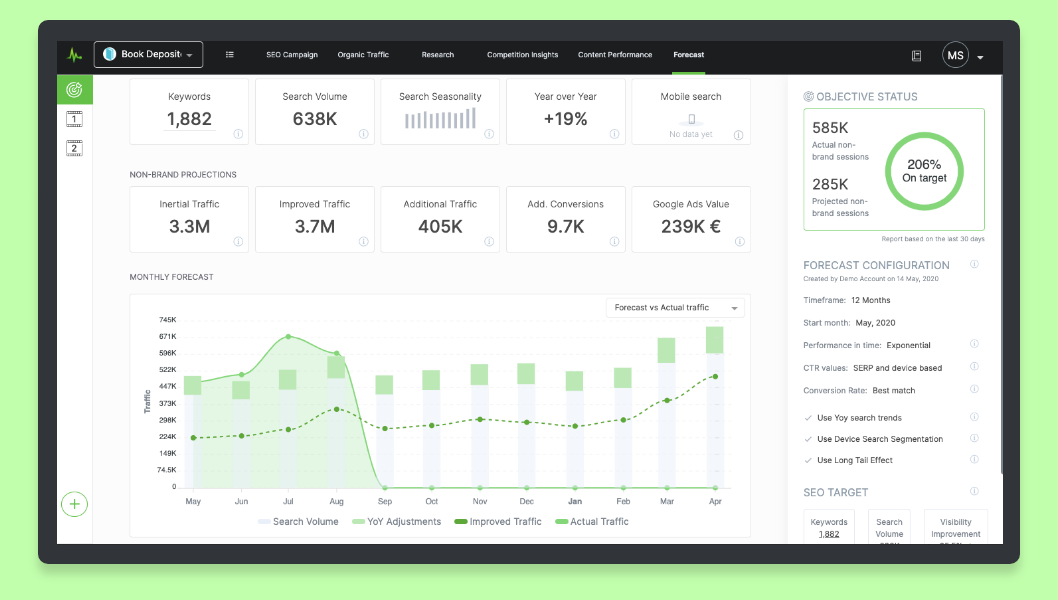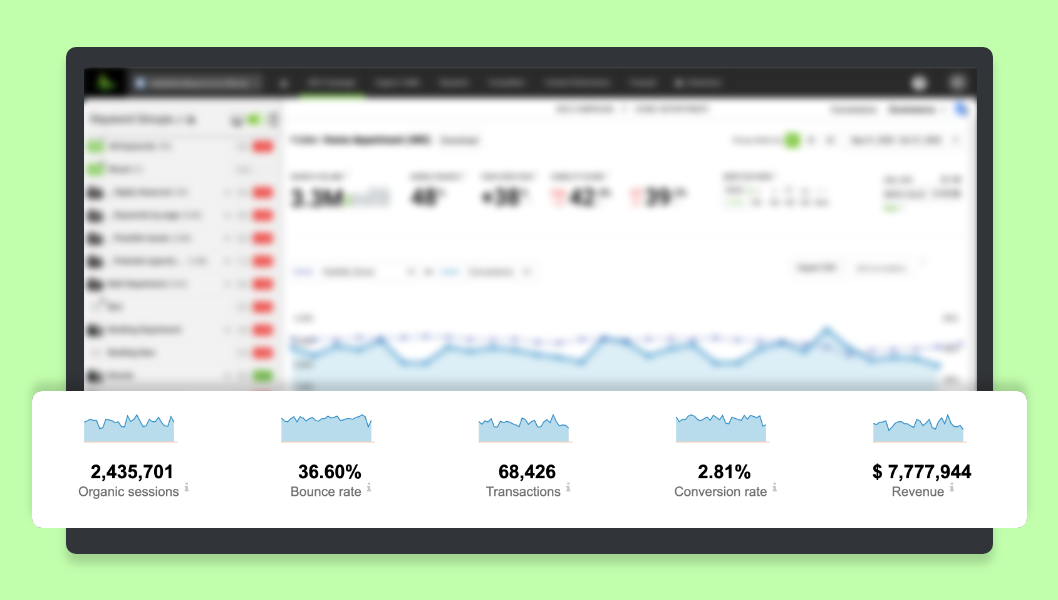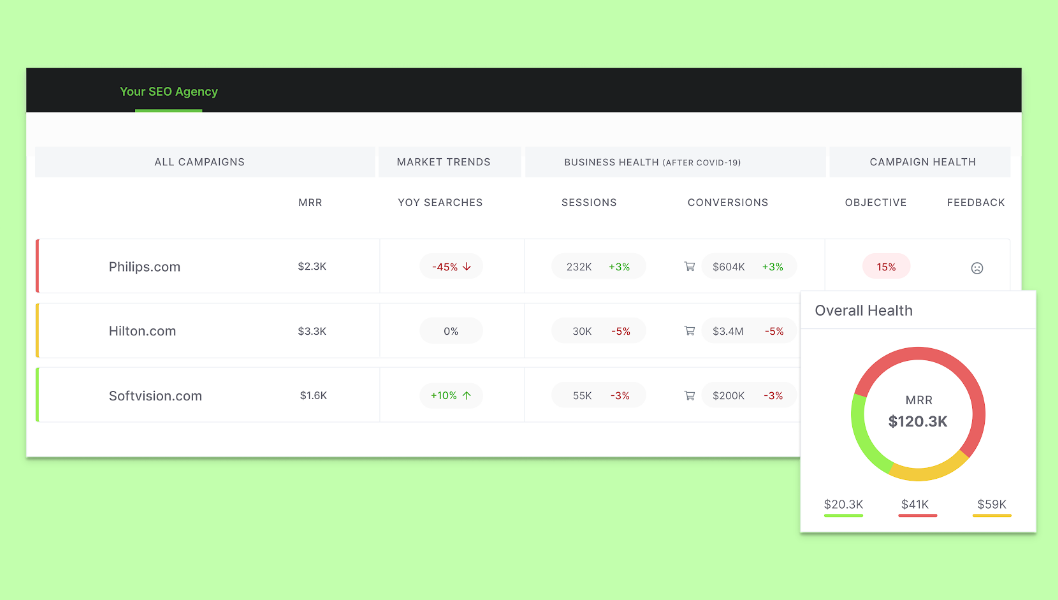Seven months into the pandemic and uncertainty is still on everybody’s lips, minds, and marketing budgets.
A double-edged sword for SEO and digital marketing agencies.
On the one hand, there are companies willing to invest in marketing, but looking toward short-term tactics and fast results. On the other hand, there are those starting to consider digital marketing and SEO strategies as important to invest in instead of “nice to have” in their strategy.
And the statistics tell a similar story – although marketing budgets are shrinking, in the U.S. market, for instance, marketers expect an 8.4% increase in digital marketing spending according to the American Marketing Association.
After all, as this McKinsey study shows, digital services keep on growing at an accelerating rate, although with relevant differences across industries – with purchasing high in groceries and apparels and searching for information high in telecom, banking, insurance, etc.
In this mixed scenario, SEO agencies can adapt their positioning, strategy, and services. We spoke to a few that tested some avenues and uncovered others in our extended research.
From SEO and paid search to conversion rate optimization and consulting, here are different strategies you can explore for your agency.
Adapt the SEO Strategies to the Current Context
If the start of the pandemic meant shrinking or even pausing campaigns, now it’s all about adapting SEO work to the bigger picture.
The McKinsey study also underlines that many companies saw their organic traffic grow fivefold during these times, so the landscape is constantly changing.
One way to approach this “new normal” is re-forecast the clients that are coming back to your agency and adapt your SEO proposals for new acquisitions: How is the client’s business looking right now?
Think about how search volumes were impacted and get data from Google Ads, or even Google Trends, to identify the main topics in your client’s industry. Check year over year search data and try to discern between seasonality and COVID-19’s effects on your targeted keywords.
With these calibrations at hand, look at non-brand organic traffic as this is the one you truly influence with your SEO performance and estimate the potential business impact (possible growth in sessions and conversions).
Another way is to focus on optimizations that bring efficient results like Google My Business, local SEO, on-page, and link building actions.
Greg Walthour, CEO and founder of SocialSEO, said that it’s the moment to make SEO work harder instead of completely shifting from SEO to something else. It’s also a good time to include paid search in the mix, although the competition is higher there right now, he added.
He further advises companies to consider a hybrid strategy of the now and the later which covers both short-term and longer-term digital marketing tactics for better results, including creative paths like social media and influencer marketing.
Ioana Vacarasu, Head of Business Development at Upswing, offers a complementary point of view.
“Digital marketing has become a priority for a variety of clients, while SEO is more than something nice to explore now,” she said.
So the agency uses its proprietary tool, COVID-19 Data Trends, to proactively communicate market insights with their clients, including on-hold ones, and help them with uncovering their customers’ intent. To further respond to the clients’ needs, the agency also proposes strategic partnerships with PPC or Digital PR agencies, which in turn become good referral sources.
Rather than a client coming and asking for PPC/SEO services now, customers are directed towards making decisions about channels.
Reframe the Role of SEO in the Marketing Strategy
The need for a deeper understanding of the client’s business is even more present. And points at new avenues that agencies should test and services they could diversify.
“Agencies are trying to make a real effort to show how their services are working together. There’s this trend in trying to be more integrated. And, sometimes, when you’re trying to deliver an integrated solution you discover that they would need a CRM system or CRO which you haven’t thought about until now,” said Arianne Donoghue, founder of Tempest Marketing.
Yet, the challenge is to be more creative with less.

SEO, CRO, and Content
“Your SEO traffic doesn’t necessarily have to increase,” Walthour added. “But you can optimize conversion – it takes care of all lead generation channels, even the offline ones.”
So you can think of ways that a hybrid optimization approach can benefit your client. Even at the level of keywords management, you can look at the opportunity versus difficulty scenarios and evaluate their relevance based on generated sessions and conversion rates. This will help you curate the targeted lists and focus on the higher converting ones.
Or maybe there’s an opportunity to optimize content at scale. You can start by creating a content audit and transforming this service into another way of adding value to the client’s business – spotting opportunities for content marketing, mixing on-page content optimization with link building tactics, and even improving the user experience for higher conversion rates.
Let’s take B2B companies, for example. Their marketing and sales efforts were more in line with events and referrals, but now they’re becoming more digitally focused. It’s an opportunity for SEO agencies to help them better understand their customer profiles, and create strategies based on their informational and transactional needs, as Donoghue mentioned in one of our talks.
PPC for Future SEO Keywords
To keep the theme of short-term results and long-term vision, a mix of SEO and PPC services can be the answer for some clients.
Maybe you can create a PPC campaign for the keywords that you’re targeting for future SEO development. This way, you make sure to satisfy the need for fast intervention, while building an efficient scaffolding for your SEO campaign.
Or maybe you need to test long-tail keywords that will further inform your content strategy or future SEO efforts. With the paid search results you’ll be able to create more clarity on the client’s ROI and make fast adjustments to the overall strategy.
Traffic-Focused Link-Building & PR
Search trends are critical in the current market, as they pinpoint demand and hint at the new ways people are behaving online.
They’re also a relevant starting point for researching “hot topics” that a business can connect with their integrated SEO and link building efforts.
You can take into account building actual short-term campaigns, optimized for traffic and/or PR results, that will help increase domain authority, while also supporting your client’s SEO investments. This is where interesting client data comes in handy – they hold the expertise and the necessary insights for building newsworthy content.
For instance, Upswing adapted a retailer’s content strategy by mapping buyer personas and how their behaviors shifted during the pandemic in order to respond fast to their demands for non-perishable products, as seen in informational queries.
Assume a Consultative Role
“Rather than a client coming and asking for PPC/SEO services now, customers are directed toward making decisions about channels,” Donoghue said. “It’s not only about marketing. How do you solve real needs?”
With this big question in mind, SEO agencies can take the consulting route and use search data to help businesses figure out where they are in relation to their competitors and their customers.
One example could be using “people also ask” data to generate better FAQ pages for companies with a high cost of customer service like airlines, telecom, retailers, etc. It can also inform their training or internal processes.
Another example can be a gap analysis on your client versus their competitors in terms of trending topics to leverage.
It’s also the time to use your data advantage as an agency and connect the dots – maybe you’re helping your clients with setting up micro-targeting points inside their brand ecosystem, maybe it’s more about connecting search intent with emotion and the right messaging, maybe it’s more about highlighting gaps in their digital marketing strategy.
Or as Vacarasu further puts it:
“Brands knock at our door asking to look good in SERPs so that they can, eventually, convert while being useful. It’s not rare, though, for them to come looking to solve just a tiny aspect around these needs. So being hungry about what we can learn in the discovery phase can unlock amazing opportunities.”
She continues: “our discovery methodology is set to learn more about the brand than it knows about itself: discovery interview, questionnaire, preliminary keyword research, competitor landscape analysis, on-page and off-page opportunity analysis. In other words, a pre-audit that helps us gain perspective, advise and guide our potential future clients towards the best business decisions; even when those don’t involve SEO solutions. And I guess this is a proper shift from these are our services, choose and we’ll assist you to this is what we learned, here is how you can make the best use of all that.”
For example, when an important player in the retail industry asked Upswing for content editing at scale, the agency leveraged both their proprietary tools and know-how to spot a wider range of opportunities and recommend an alternative content auditing and optimization strategy that would scale the retailer’s business.
One last thing.
SEO campaign data can inform you of your client’s business health. Tracking the number of monthly sessions and conversions, and their trend allows you to create a health scale for each client and their campaigns:
- Good (green).
- Average (orange).
- Bad (red).
You can also set triggers to be notified whenever the status turns from good to bad or the other way around, for fast intervention.
Keeping them in the loop and closely explaining market trends and their own health with your particular data is another good step in becoming more of a consultant and business partner to them.
Summary
The market is settling in an uncertain environment and digital marketing is on the rise.
Yet, because budgets still remain locked in a risk-averse mindset and fast business results are demanded, SEO agencies need to further adapt their trade:
- Adapt the SEO strategies to the current context: Make SEO work harder with incremental optimizations (local SEO, Google My Business actions etc.), re-forecast for realistic objectives in the new search environment, use year over year search trends to adjust strategies.
- Reframe the role of SEO in the marketing strategy: Make the case for conversion optimization, offer a hybrid approach of short-term and long-term tactics that involve both SEO and SEM, think about the importance of content audits and content marketing right now, test SEO keywords with PPC, etc.
- Assume a consultative role: Now more than ever businesses need to understand what their users want and search data can highlight that for them. Be a strategic business partner and show the gaps in the clients’ digital channels, proactively monitor their business health and help them make smart decisions about their online presence overall.
With SEOmonitor’s Forecasting module designed just for SEO agencies, we can help you further strategize and identify realistic opportunities for growth. You’ll be able to make a direct connection between possible scenarios and business results in terms of additional traffic, conversions, and more.
And to strengthen your portfolio and constantly communicate with your clients, we developed the Client Health Tracker – a feature to help you know which clients are struggling and which are growing and take action fast.
These are just a part of our solutions to help SEO agencies acquire, manage, and retain more customers.
Join us in our journey to bring more transparency to the SEO industry.
Navigate the current context
with better data!
The opinions expressed in this article are the sponsor's own.






